Difficulty swallowing, known as dysphagia, can come in many forms. Some people with dysphagia may experience issues in the oral phase or mouth. This is characterized by one or more of the following:
- holding food in the cheek without being aware of it due to weakness
- difficulty moving the food around the mouth
- leakage of the food or liquid from the mouth due to poor lip seal
- difficulty chewing related to poor dentition.
Others may have trouble originating from the pharynx, or throat, in the form of food/liquid or pills sticking in the throat or the feeling that food or liquid is “going down the wrong way,” otherwise known as aspiration.
Still others experience esophageal dysphagia which may result in one or more of the following:
- food or liquid sticking in the esophagus (the tube that connects the throat to the stomach)
- pain
- reflux (liquid coming back up the esophagus)
- heartburn
- vomiting

What can cause trouble swallowing?
There are multiple potential causes of dysphagia, ranging from neurological disorders to tumors and cancer treatments such as surgery and radiation. Tumors and cancer treatments such as surgery and radiation can also cause dysphagia in all phases of swallowing (oral, pharyngeal and esophageal).
Other disorders such as GERD (gastroesophageal reflux disease), achalasia — a disorder that makes it difficult for the esophagus to squeeze the food into the stomach — and stricture, which is a narrowing of the esophagus, all can affect the esophageal phase of swallowing. A Schatzki’s Ring is one type of stricture that narrows the esophagus and is found in the distal esophagus. A person who has this anomaly is best served by seeing a gastroenterologist who may manage the stricture by dilation.
Getting help for your dysphagia
If you are experiencing any form of dysphagia, it is important to let your doctor know. They may refer you to a speech-language pathologist (SLP). SLPs specialize in evaluating and treating many types of communication and swallowing disorders, including dysphagia that originates from the oral cavity or pharynx (throat). If your problems are occurring in your esophagus, then you should be referred to a gastroenterologist.
Dana Farber Brigham Cancer Center offers speech/swallow services. If you are a cancer patient who is experiencing dysphagia, let your oncologist know and they will place a referral to have you assessed. If you are not a cancer patient, your doctor can find speech/swallow services in most major hospitals that can assess your swallow function and determine a plan of care to address your disorder.
Evaluating the causes of dysphagia
There are a few assessments that a speech-language pathologist could use to evaluate swallowing function. They include:
- clinical evaluation
- a fiberoptic endoscopic evaluation of swallowing (FEES)
- a video swallow study (VFSS), also known as a modified barium swallow (MBS)
Clinical evaluation
The clinical evaluation takes place in the clinic or bedside in the hospital. The SLP will talk to you about the history of your swallowing problems and then look at your mouth, including lip and tongue movement and strength, as well as jaw opening. They will observe you eating and drinking and assess for any abnormalities. At that point, they may recommend further assessment with a FEES or VFSS, or referrals to an ear nose and throat doctor (ENT) or gastroenterologist.
Fiberoptic endoscopic evaluation of swallowing (FEES)
During a FEES, a scope is passed down your nose into your throat and you are given food and liquid. The SLP can watch you swallow and determine if the food is getting stuck, where it is getting stuck, and why. They can also see if the food or liquid is going into your airway. From there, they will make recommendations on safest diet, strategies to use to improve swallowing, and exercises if appropriate.
Video swallow study (VFSS), also known as a modified barium swallow (MBS)
A video swallow study is completed in the radiology department. You are given barium of different consistencies (liquids, solids, pudding, and tablet) to swallow while being imaged by a type of X-ray called fluoroscopy. Barium is a radiopaque substance that allows providers to view the food or liquid as it transverses through the oral cavity, throat and esophagus. The SLP can assess for the cause of your dysphagia and make recommendation to improve swallow safety and function.
If you are seen by a gastroenterologist, they may refer you for a barium swallow/esophagram to assess esophageal functioning while swallowing barium. They may also recommend a procedure to examine the upper GI tract using a camera attached to a flexible tube called an endoscope.
Dysphagia related to cancer
Certain cancers, such as those related to the mouth and the throat, can cause pain when swallowing as well as difficulty moving the food around in the mouth and chewing. They may also cause a feeling of food or liquid becoming stuck in your throat and that food or liquid is going down the wrong way.
Esophageal cancer, for example, may cause pain in the esophagus when swallowing, a sensation of food or liquid being stuck in the chest area, and regurgitation of food or liquid.
These swallowing deficits may improve with cancer treatments. On the other hand, your cancer treatments i.e. surgery, chemotherapy, and radiation, can contribute to swallowing difficulty. Your providers will further explain the effects of the treatment on swallowing.
If you have head and neck cancer, it is important to see a speech pathologist to help preserve swallow function as you go through treatment. They can recommend safest diet textures and strategies to help decrease dysphagia, as well as instructions on exercises to maintain or improve strength and range of motion of the swallowing muscles.
